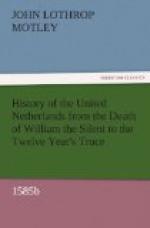“There past this way many Spanish soldiers,” wrote Stafford from Paris, “so poor and naked as I ever saw any. There have been within this fortnight two hundred at a time in this town, who report the extremity of want of victuals in their camp, and that they have been twenty-four months without pay. They exclaim greatly upon the Prince of Parma. Mendoza seeks to convey them away, and to get money for them by all means he can.”
Stafford urged upon his government the propriety of being at least as negligent as Philip had showed himself to be of the Spaniards. By prohibiting supplies to the besieging army, England might contribute, negatively, if not otherwise, to the relief of Antwerp. “There is no place,” he wrote to Walsingham, “whence the Spaniards are so thoroughly victualled as from us. English boats go by sixteen and seventeen into Dunkirk, well laden with provisions.”
This was certainly not in accordance with the interests nor the benevolent professions of the English ministers.
These supplies were not to be regularly depended upon however. They were likewise not to be had without paying a heavy price for them, and the Prince had no money in his coffer. He lived from hand to mouth, and was obliged to borrow from every private individual who had anything to lend. Merchants, nobles, official personages, were all obliged to assist in eking out the scanty pittance allowed by the sovereign.
“The million is all gone,” wrote Parma to his master; “some to Verdugo in Friesland; some to repay the advances of Marquis Richebourg and other gentlemen. There is not a farthing for the garrisons. I can’t go on a month longer, and, if not supplied, I shall be obliged to abandon the work. I have not money enough to pay my sailors, joiners, carpenters, and other mechanics, from week to week, and they will all leave me in the lurch, if I leave them unpaid. I have no resource but to rely on your Majesty. Otherwise the enterprise must wholly fail.”
In case it did fail, the Prince wiped his hands of the responsibility. He certainly had the right to do so.
One of the main sources of supply was the city of Hertogenbosch, or Bois-le-Duc. It was one of the four chief cities of Brabant, and still held for the King, although many towns in its immediate neighbourhood had espoused the cause of the republic. The States had long been anxious to effect a diversion for the relief of Antwerp, by making an attack on Bois-le-Duc. Could they carry the place, Parma would be almost inevitably compelled to abandon the siege in which he was at present engaged, and he could moreover spare no troops for its defence. Bois-le-Duc was a populous, wealthy, thriving town, situate on the Deeze, two leagues above its confluence with the Meuse, and about twelve leagues from Antwerp. It derived its name of `Duke’s Wood’ from a magnificent park and forest, once the favourite resort and residence of the old Dukes of Brabant,




